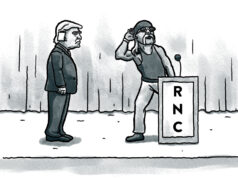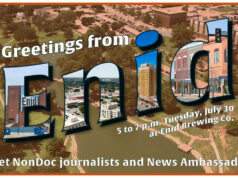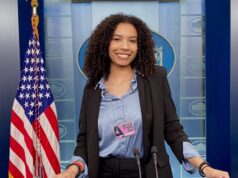With about 92 days remaining until U.S. voters choose their next president, the Tulsa World published its endorsement editorial Aug. 7.
Except that it didn’t.
Under a headline reading “Tulsa World endorsement: For president? None of the above,” the paper’s editorial board punted, calling Hillary Clinton “a lousy politician” and Donald Trump “a brilliant politician” before declining to endorse either.
While the World’s explanation of the situation and 2016 election implications is cute, it’s also naive and useless.
Additionally, the paper omits libertarian presidential nominee Gary Johnson from the discussion entirely, appearing ambivalent that Oklahoma voters have a third-party option with national prominence for the first time since Ross Perot received 23 percent of the Oklahoma vote in 1992.
In all, the Tulsa World’s editorial highlights the idiocy of newspaper political endorsements.
Three big questions about endorsements
Newspaper endorsements in general raise a few questions that typically no one seems to ask or discuss.
Why is a newspaper writing a candidate endorsement in the first place?
Who within the publication’s hierarchy is really deciding which candidate gets endorsed?
How much do the political leanings of a paper’s readership — and advertisers — affect its endorsement?
Aside from “we’ve always done endorsements,” newspaper editors, publishers and reporters might argue that they are better tuned into civic processes, candidates and campaigns than the public at large.
They would be right, and thus forms a primary basis for newspaper editorial boards to offer their collective endorsement of one candidate over the other.
But a paper’s endorsement is not always representative of the paper’s staff opinions, nor its leading journalists.
Papers seeking to display transparency about how an endorsement decision is made can offer a list of editorial board members and their final “vote.” The Tulsa World does not choose to do that, nor does The Oklahoman.
Cynics might take that lack of transparency (and voting) to mean that a paper’s endorsement editorial is sometimes affected by factors outside the beliefs and analysis of its editors. NonDoc has heard rumblings to that effect regarding the World’s endorsement in Tulsa’s recent mayoral election, but that’s another story.
More relevant, however, may be how newspapers get caught between a rock and a hard place when considering candidates and their readership/advertising bases.
As a result, a large newspaper in Oklahoma might receive as much blowback (cancellations of subscriptions or advertisements) for endorsing a liberal Democrat as newspapers in, say, Connecticut might get for endorsing a conservative Republican.
To that end, the World’s non-endorsement opened with the interesting line: “Since 1940, the Tulsa World has consistently endorsed the Republican nominee for president, but we’re not willing to do that this time.”
That’s an original way of saying a newspaper’s endorsement decision makers don’t like Democrats, a theory granted extra evidence by the World not endorsing Clinton, a uniquely experienced candidate who faces a uniquely inexperienced one.
At that point, why waste ink on writing a non-endorsement at all?
Further, what would an endorsement of Trump have meant to his presidential aspirations? What about an endorsement of Clinton?
Nothing, obviously.
So if there’s no reason for the Tulsa World to endorse in 2016 — or even to mention the third-party candidate — what possible reason could there be to endorse in any other year?
By choosing “none of the above,” the Tulsa World proved its political endorsements are pointless.






















